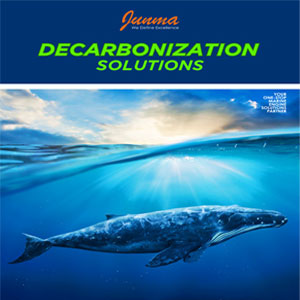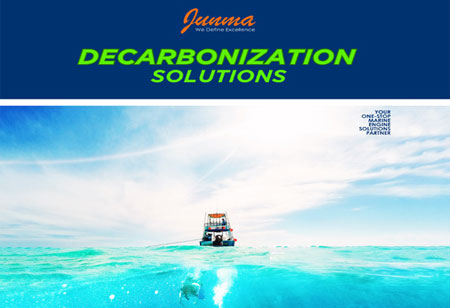
The maritime service industry in Singapore is advancing rapidly, transforming the region into a global hub for maritime business. New technology and the digitalization of ports have unlocked even more efficiencies. That said, the increasing sophistication of environmental standards is exerting pressure on the industry to develop better practices, including the need to decarbonize. As one of the world’s largest shipping centers, Singapore intends to minimize CO2 emissions and switch to cleaner solutions. This aligns with international climate agreements and positions Singapore to lead in sustainable maritime practices.
At the forefront of this transition is Junma Services, contributing significantly to decarbonization through its engine efficiency innovations. The company enhances fuel efficiency through engine de-rating and part-load performance optimization with eVIT technology, benefiting a wide range of engine types. These efforts started with developing the EEXI-EPL solution, which is now successfully applied to nearly 1,000 vessels.
“We noticed that large container vessels faced substantial power reduction penalties, as many vessels' EPL levels are below 50 percent, forcing them to limit the fuel index to even below the starting requirement," says Yulin Ma, Managing Director.

D-rating can save SFOC as high as 30 g/kWh which means for a 6,600 TEU container vessel, the fuel saving around 5,000 tons of fuel annually
In recent years, Junma Services has implemented numerous decarbonization measures aimed at improving engine performance and reducing fuel consumption. This began in the early 2020s as the company identified the need for EPL solutions as a gap. Since then, the scope of their activities has expanded considerably.
By 2022, the company had significantly improved its EPL technology, making it compatible with most two-stroke and four-stroke engines. Their enhanced EPL solution now includes not only calculations and applications but also covers all governor types and various engine models and configurations.
This advancement helped Junma secure contracts with major shipping companies like Pacific International Lines and Eagle Bulk Shipping Inc. With EPL systems installed on almost 1,000 ships and approvals from various maritime classification bodies, the company has enabled better engine management, ensuring compliance with environmental standards, realizing fuel savings, and improving operations.
Additionally, Junma’s efforts extend to optimizing fuel consumption when engine power is limited by EPL norms. A recent successful trial of their VIT fuel-saving technology showed a significant reduction in fuel consumption, encouraging the company to promote this solution across more fleets. Junma is also actively advocating for engine derating, a more aggressive decarbonization strategy with the potential to save up to USD 6.5 million annually for a 6,600 TEU container vessel. Several customers have already expressed interest.
Adapting to Market Dynamics
Junma Services has demonstrated remarkable adaptability to market conditions and achieved technological advancements. Between 2016 and 2017, the demand for electronic control engines picked up, leading the company to partner with a Singapore-based service provider to develop test benches. This partnership enabled them to incorporate electronic engines into their product offerings, a move further
bolstered by the 2018 appointment of Mr. Yang, an expert in electronic engines, to Junma’s board of directors. This strategic decision accelerated Junma’s growth and expanded its services to include dry-dock solutions with integrated service solutions.
Digitalization has also enhanced Junma’s training and customer relations. Engineers can now receive training through digital materials, even while onboard, improving operational efficiency and credibility. A key example of Junma’s shift toward being a solutions provider is its comprehensive approach to EEXI regulations, offering a complete solution for energy efficiency with minimal engine exclusions. Innovations like engine derating and eVIT optimization have led to considerable fuel savings.
Customer-Centric Approach
Since its founding in 2005, Junma Services has maintained a strong customer focus. Initially, the company supplied spare parts to meet clients' needs and gradually expanded its services. By 2016-17, Junma had developed electronic control engines and collaborated with service providers to strengthen its presence in Singapore.
Junma’s service packages, which include spare parts backed by warranties, are a testament to their commitment to customer satisfaction. For example, even during market downturns, Junma retained skilled engineers and technicians, positioning itself to meet demand when the market recovered. This approach has enhanced customer relationships, with the company now offering remote assistance to efficiently resolve client issues.
The company’s innovation lies in training its engineers skilled in multiple functions, eliminating the need for specialists. This flexibility has set an industry standard, with many companies adopting Junma’s full-service package model. Such a model aims to offer customers recommendations, quotations, and service delivery through an efficient supply chain.

Innovative Strategies for Engine Optimization and Emission Reduction
As Junma prepares to enter the promising Indian market, the company is poised for exponential growth, planning to establish new facilities to tap into its vast potential. A key factor in their success is their partnership with shipyards, which operates under a franchise-like model that has gained momentum through joint workshops with various shipyards, including the most recent collaboration with IMC-SY in China. This foundation is also driving Junma’s efforts to build a global network through closer cooperation with other key industry players.
With EPL systems installed on almost 1,000 ships and approvals from various maritime classification bodies, the company has enabled better engine management, ensuring compliance with environmental standards, realizing fuel savings, and improving operations
Fuel Efficiency and Emission Reduction
Innovation is a core value for Junma, with two major initiatives—engine derating and the eVIT project— holding great potential for fuel savings. A recent case study on engine derating for a 6,600 TEU container vessel highlighted impressive results: approximately 5,000 tons of annual fuel savings, translating to a reduction of 15,765 tons of CO₂ emissions. This equates to an estimated USD 3.5 million in cost savings, even before factoring in the European Union’s Emissions Trading System.
Comprehensive Solutions for Emission Reduction
Junma’s Managing Director, Yulin Ma, advocates for holistic solutions to marine engine optimization. His design package includes retrofitting high-efficiency propellers and shaft generators to fully exploit the low SFOC (Specific Fuel Oil Consumption) of the main engine. This holistic solution has garnered significant support from major classification societies and flagships, offering clear guidelines on how to implement these emission reduction measures. The financial impact is substantial, with projected annual savings reaching USD 6.5 million and an incredibly short ROI period of just one year.
Optimizing Normal Operation Load
Junma's success extends beyond engine derating. Recognizing that it is often impossible to operate the main engine at optimal loads due to EPL restrictions, the company has developed ways to optimize engine performance at normal operating loads. In collaboration with Teekay Shipping, a leading industry player, Junma conducted experiments that achieved higher combustion pressures and improved fuel efficiency. The results were impressive, with fuel saving ranging from 2.24 to 8.1 g/kWh at different loads. These gains have not only reduced emissions but also provided rapid returns on investment, in most cases within six months.
Promoting Environmental Goals
Encouraged by these remarkable results, Junma remains committed to helping its customers achieve their environmental objectives. The company actively participates in marine exhibitions and webinars to share knowledge and experiences. By promoting its innovative projects, Junma aims to expand its audience and support more clients with cutting-edge solutions that drive a sustainable future for the maritime industry.
We use cookies to ensure you get the best experience on our website. Read more...